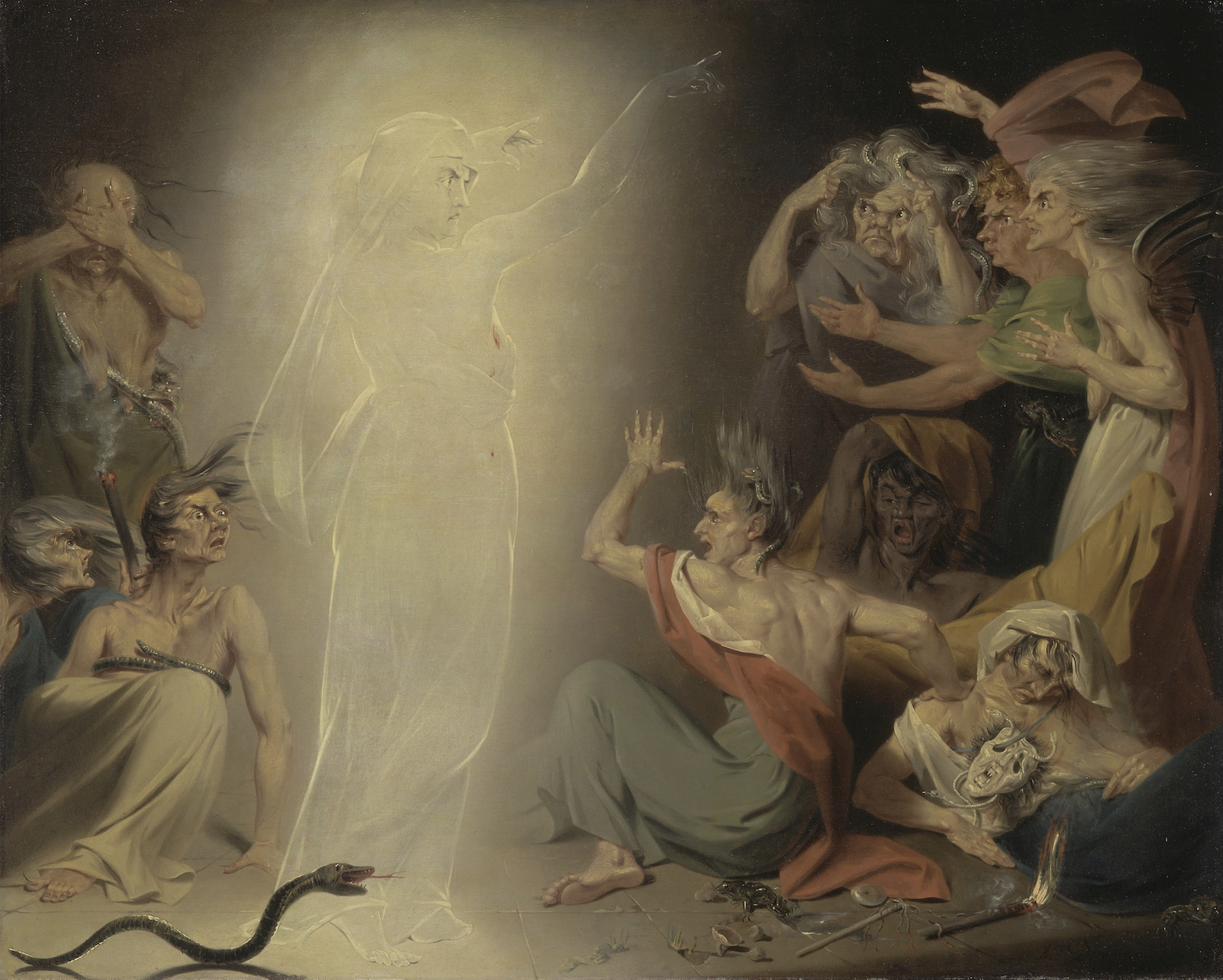|
|
 |
UPDATE: Fixed a couple of typos regarding Week 15. (11/20/24)
Updated Quiz 3 as a take-at-home. (11/14/24)
Postponed Quiz 2. (10/14/24)
Fixed the description of the stuff covered on Quiz 2. (10/1/24)

Downman, The Ghost of Clytemnestra Awakens the
Furies
CLCV 3880: Monsters, Ghosts, and Magic
Tuesday/Thursday
2:30-3:45
Eppler Center 223
Professor:
James M. Pfundstein, Ph.D.
Shatzel 222
Office Hours: Tuesday12:30-1:20, or by appointment.
Office phone: 419-372-8278
e-mail: jmpfund@bgsu.edu
web-page: http://blogs.bgsu.edu/pfundblog/
Facebook: james.enge
Bluesky: jamesenge
Texts:
(links are for your convenience, not endorsements of any particular online bookseller)
Hansen, W. The Book of Greek and Roman Folktales, Legends, and Myths (Princeton, 2019) (ISBN: 978-0691195926)
at AmazonOgden, D. Magic, Witchcraft, and Ghosts in the Greek and Roman Worlds (Oxford, 2009) (ISBN: 978-0195385205)
at Barnes and Noble
at Google Books
at Amazon
at Barnes and Noble
at Google Books
Online resources:
What is standard manuscript formatting? For the purposes of this class, refer to the link below.
https://jamesenge.com/GenericMythArgument.wordformat.pdf
The Theoi Project is a copiously illustrated and scholarly guide to Greek mythology.
Tufts University's Perseus Project: Texts, Translations, and also Images from the classical worldhttp://www.perseus.tufts.edu/hopper/collections
Carlos Parada's Greek Mythology Link: Images and summaries.
http://homepage.mac.com/cparada/GML/index.html
The single best resource for urban legends (our modern myths) is Snopes.com.
https://www.snopes.com/
Here's
a list of university resources and policies. I particularly
recommend the resources.
https://jamesenge.com/BGSU.ResourcesAndPolicies.htmletc!
If you find a good resource, let me know. I'll be expanding this section as more stuff comes to my attention.
Course Expectations:
1. Expectations for Behavior: Abide by Wheaton's Law . For details, see the BGSU Codes of Conduct .
2. Expectations for Learning: This is a survey course in medieval legends, and will involve readings in translation from a variety of sources (Greek and Latin). By the end of it you should have a good sense of what myth is (as opposed to, say, religion, or magic), and what types of myth there are; you will have had a chance to read and write and think about these myths and their applicability to our culture and our time.
Survey courses are, of necessity, somewhat heterogeneous. This means that I'll be covering a lot of topics which may not obviously be related to each other, and also I will use a lot of words like "heterogeneous". You might think of the myths as the members of an extended family. They're not all the same, and none of them are exactly the same. But there is an undeniable organic relation between them, and the more of them you know the more you will see the resemblance.
3. Course Aim: To extend your opportunities to study mythology and its impact on the modern world; to give you opportunities to read and write and think about difficult cultural material; to build a bridge from the ancient to the modern world.
4. AI Use Guidelines:
Don't use generative AI (i.e. chatbots) for the assignments in this class. Setting aside the fact that chatbots routinely violate intellectual property law and are ethically and environmentally unsustainable, the technology does not work as advertised. It cannot cite required sources accurately, for instance (unless it happens to be plagiarizing a source that does). These programs don't create writing based on knowledge; they generate text using statistical probabilities and a very large database, a process that has been described as "stochastic parroting". If you've ever seen a weird autocomplete on your phone, be aware that this is what AI does routinely. It's instantly obvious to anyone who reads carefully, which is one of the things you're paying me to do.
"Aha, Pfundstein!" you may say in the silent precincts of your heart, "how will you know, know for a fact that I used AI? If not, how can you ban it?"
I don’t ban it (except insofar as it’s already banned under the intellectual honesty section of the BGSU code of conduct). But I grade for elements that generative AI can’t provide (e.g. accurate and relevant citations of specific evidence)—not to exclude text written by chatbots, but because the ability to do that stuff is a sign of actual intelligence (which, despite the name on the label, AI doesn’t have). You could generate a first draft for your paper using a chatbot, then laboriously go in and add references from the required texts. But, of course, to be useful, the references are going to have to be relevant to the argument. You could then rewrite the essay to make it more relevant to the required texts. But, if you’re looking for the quickest and easiest path to success, you might find that it’s just easier to write the damn thing yourself.
"So what do I write about?" is a question I hear a lot, and it’s a reasonable question, especially if you haven’t had a course like this before. Step one is to read the stuff. If you read the texts, you’ll find something interesting or irritating enough to say something about; just say it in print, rather than out loud. I also include topics and questions alongside the reading schedule that may jog something.
Learning Objectives:
A. Demonstrate engagement with, and appreciation of, the aesthetic richness, imaginative power, and historical significance of mythological texts and artifacts.
B. Deploy empathy, persuasion, reason, flexibility, listening, collaboration, compromise, and conflict resolution in considering authentic problems, making arguments from multiple points of view, and devising solutions.
C. Tolerate diversity, difference, ambiguity, and the absence of definitive solutions to complex issues.
D. Develop an awareness of the interconnections between the classical world, the medieval world, the modern world, and the self.
E. Produce original work of scholarship and/or creative work that engages with the classical and the modern world.
Grading:
|
|
|
Assignments:
Quizzes are strictly objective (true/false, matching, short ID, visual ID, etc) based on the readings and lectures. They'll be administered in class.
Arguments are 500-word (minimum) essays based on the readings, lectures, and discussions as listed in the schedule. They should include a brief thesis statement ("Classical myths are really about potatoes!"), defended by an argument ("Because potatoes are the only thing that appear in every one of the myths that we saw in this section!") supported by evidence ("[Potato-Myth 1], [Potato-Myth 2], [Potato-Myth 3]," etc.) documented by precise citations ("...in reading 117 of Ogden", "on p. 227 of Hansen", etc). You'll submit them online through Canvas. The assignments will go go live the Monday before they're due. (Don't email them to me, or send me hardcopies via carrier pigeon, etc.)
Cite the source of anything you quote or paraphrase, and always cite as specifically as possible. For a modern book this means page numbers. Ogden and Hansen both If you're using an e-copy of a book without page numbers (a) make sure that there aren't actually page numbers, then (b) use the electronic location number instead. Don't cite sources other than the required readings unless you have some very strong reason for doing so: I want you to show me that you know the assigned material, not that you know how to google stuff. If you've finished the assignment without mentioning any of the required readings, go back in and include citations from these sources.
Use standard manuscript formatting for the arguments and the final project.
The Final Project: a 1000-word paper (which can be a longer version of the argument-style essay, or some other project as negotiated with the instructor). The assignment will go live on Canvas the Monday before it's due.
|
THE FINE PRINT : |
|
No makeups given due to absence without prior arrangement with the instructor. |
|
No one can pass the course without passing the final quiz and turning in the final project. |
|
No incompletes issued except for pressing reasons and by prior arrangement with the instructor. |
|
"Outside of a dog, a
book is a man's best friend. Inside of a dog it's
too dark to read"—Groucho Marx |
|
The instructor reserves the right to recognize significant improvement (or decline) in student performance when awarding the final grade. |
|
The maximum amount of extra credit which may count towards the final grade = 5% of the total course points. |
|
The syllabus is subject to change at the discretion of the instructor; changes will be announced in class and posted on-line. |
SCHEDULE
